A triumphant Carlton runs the premiership lap of honour after winning a nail-biting 1979 grand final against Collingwood. Photo: FAIRFAX SYNDICATION
History Lesson – Blues’ finest finally get the credit they deserve
By ROHAN CONNOLLY
Between 1979 and 1982, Carlton dominated league football, winning three of the four premierships on offer, and winning 76 of 98 games, a strike rate of 78 per cent.
It’s a record that stands up very well against other great teams of the modern era, Brisbane in the early 2000s, Geelong between 2007-11 and Hawthorn’s recent three flags in a row. Yet for some reason, the Blues aren’t often mentioned in the same breath.
Perhaps that has something to do with the reputation those champion Carlton teams forged away from the football field.
The Blues were big drinkers, hard partiers, and tales of their exploits, like an infamous visit to The Lodge when the players walked away with the silver service cutlery, or the late night adventures of the likes of Wayne Johnston, Jimmy Buckley and Val Perovic, have become the stuff of football legend. Now, though, thanks to author Dan Eddy, whose book “Larrikins and Legends” takes an in-depth look at Carlton’s finest era, a bit of balance is being restored to the ledger.
Eddy spent considerable time interviewing not only the stars of those triumphant days, but many of the bit players as well, and the result is fascinating reading.
After Carlton won the 1972 premiership, its third in a five-year span, the Blues drifted for several years despite a glut of individual talent and roll call of instantly recognisable names. It was Alex Jesaulenko’s appointment as captain-coach six rounds into the 1978 season that whipped, almost literally some would argue, an under-performed group into top gear.
Jesaulenko’s torturous training sessions, in which players would run ridiculous numbers of laps, sprints over and over again, and drag tyres filled with bricks around behind them, themselves became the stuff of legend, a story from Carlton cult figure Vin Catoggio typical.
“Wayne Harnes was competing with somebody else, and he was that tired that he fell to the ground and couldn’t get back up,” Catoggio said.
“Jezza went up beside him and said, ‘Harmesy, get up!’ He said ‘I can’t,’ and Jezza said again ‘get up!’ to which Harmsey said, ‘Fuck you, I can’t!’ ‘If you don’t get up we’re going to stay out here as long as you want,’ so everyone was yelling ‘Harmesy, get up!’ He dragged himself to his knees, then got up on his feet and went for the next ball and again fell flat on his face. It was incredible to watch.”
After a rare loss in 1979, Jesaulenko had promised his players a tortuous Tuesday evening session and duly delivered. It began with three 1500-metre time trials, then 10 x 800’s,10 x 400’s, 10 x 200’s, and then man-on-man contesting for the rest of the night. “We started at five o’clock and we got off the track at twenty-to-eleven,” Harmes recalls.
But Carlton, already a skilful side, reaped the benefits of the extra physical and mental resilience their brutal coach had instilled in them, particularly Harmes.
In the grand final against arch enemy Collingwood, it was he who only won the very first Norm Smith Medal, named after his great uncle, but who delivered one of football’s most famous moments, chasing his own errant kick to the boundary, diving full-length and fisting the ball into the path of Ken Sheldon, who kicked what proved to be the match-winning goal in the five-point thriller against Collingwood.
True to the club’s reputation of the time as loud, boisterous and perhaps arrogant, what ensued was not a basking in the premiership glow, but a civil war, when during a bitter boardroom split, Jesaulenko backed the incumbent, George Harris, lost, and promptly departed for St Kilda.
Jesaulenko’s old mate Percy Jones, asked to fill the breach in 1980, got Carlton to second on the ladder, only for the Blues to go out of September straight sets. He, too, was unceremoniously tipped out. But the next man for the job, former Hawk David Parkin, would prove a masterstroke.
Carlton powered through the 1981 season, finishing on top of the ladder, comfortably beating Geelong in the second semi-final to earn a second week off, ready to face Collingwood, again playing the role of underdog, preparing for its fourth final in as many weeks.
Parkin was meticulous in his planning, his side perfectly prepared and a warm favourite. But grand final nerves remained an issue.
“Before the game, I went into our rooms and only five blokes were ready for the pre-match warm-up,” he recalled. “So I went into the medical room and there were seven players who were receiving a local anaesthetic, and I had known nothing about their ailments prior to that.
“That made 12, so where were the other eight players? I wandered through each room, and finally I found them. They were all lying on the floor holding hands in a darkened room listening to the psychologist, Laurie Hayden. … I staggered out of there thinking, ‘We’ve got seven physically, and eight mentally, who are incapable of doing the job today. As bad as Collingwood are, we’re not going to win with five players.”
For a time, it looked like the Blues wouldn’t, either. But two late third-quarter goals to Buckley and Rod Ashman pegged back a 21-point Collingwood lead. And in the last term, Carlton came right over the top to win by 20 points.
“My greatest memory is when Jimmy Buckley slotted the goal, and as we were going to the huddle he said, ‘Boys, they’re fucked! I cansee it in their eyes, we’ll beat this mob’,” recalls rover Alex Marcou.
“I immediately turned to watch the Collingwood players at the huddle and they were arguing with each other because we’d kicked a couple of quick, late goals. I thought to myself, ‘Yep, Bucks is right.’ We were pretty fired up.”
Eddy was able to speak to virtually everyone connected with Carlton of the era. Except, perhaps not surprisingly, the famously reclusive Bruce Doull, who left him an apologetic voicemail. Not that the author was short on tributes from his teammates testifying both to his champion qualities as a defender, and the extent of his shyness.
Warren “Wow” Jones, who would play the game of his life in the 1982 grand final, recalls a moment involving Doull from that very game.
“He hadn’t spoken to me in about five years, and at quarter-time I’ve grabbed a couple of oranges out of the bucket and I’m counting the pips as Parkin’s talking. Suddenly, Brucey tapped me on the shoulder and I thought ‘Shit! Bruce is going to ask me for some advice or something.’ I said ‘Yes Bruce?’ and he said, ‘Mate, you’re standing on my toe’!”
And it was that 1982 back-to-back triumph over Richmond, one of the most brutal grand finals of the modern era, which set the seal on this Carlton side as one of the greats.
The Tigers had finished on top of the ladder and dispensed with the Blues in the second semi-final. Carlton had struggled to get over Hawthorn in the preliminary final.
Parkin, sensing he would need a different plan of attack for the re-match with the warm favourite, took some gambles. Richmond key forward David Cloke had kicked five goals on Perovic in the second semi-final. Parkin decided to go with the much lower-profile Mario Bortolotto on Cloke instead with Perovic taking Michael Roach instead.
He also started a potential match-winner Peter Bosustow on the interchange bench alongside Marcou. Both gambits paid off big time, Cloke and Roach quelled, and the “Buzz” and little man Marcou playing big second halves in a bruising, draining game played in difficult conditions.
Carlton were known for their big third quarters. It was no exception in the game that mattered most, the Blues booting 5.4 to Richmond’s 0.6 to take a 17-point lead to the final break, the historic win sealed by Marcou’s goal on the run late in the final term.
Nine Carlton players, Doull (who’d played in his first flag back in 1972), Sheldon, Buckley, Harmes, Johnston, Marcou, Mark Maclure, Peter McConville, and skipper Mike Fitzpatrick played in all three premierships. They were heady days, that wouldn’t last.
Carlton wouldn’t win the flag again for another five years. Indeed, the Blues have won only another two in the subsequent 35 years, and endured, through the mid-2000s, their darkest hours, and their only wooden spoons.
But the Blues of 1979-82 aren’t remembered so fondly by the faithful only because they were representative of the last great era Carlton have had, nor just for their exploits around the various pubs, bars and nightclubs of Melbourne.
They were a super football team, one full of bona fide stars, one which played eminently watchable football, and one which in hindsight was only a breath or two away from winning four consecutive premierships.
Theirs is a legacy that deserves more acclamation, and it’s one Eddy’s book does a fine job in delivering.
Larrikins & Legends, by Dan Eddy (Slattery Media Group). Books available at books.slatterymedia.com.

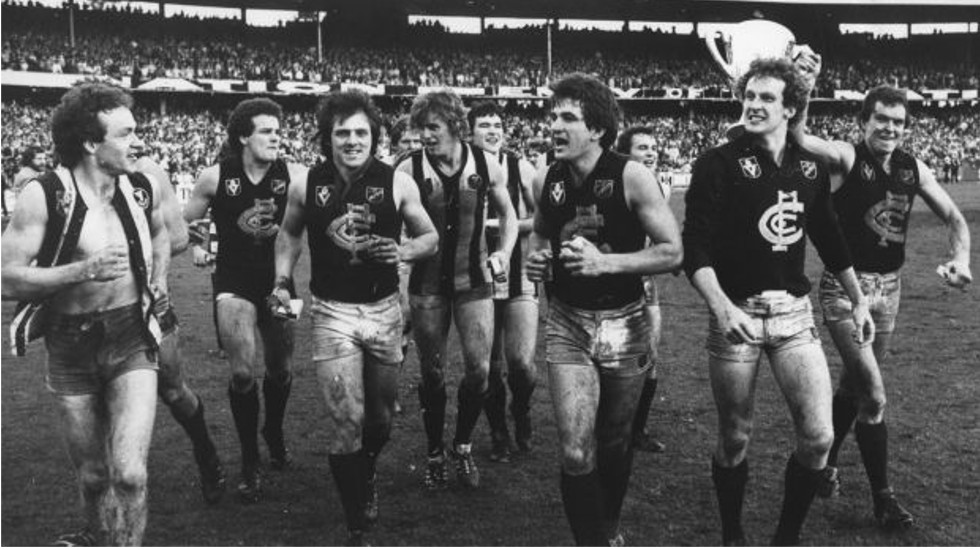
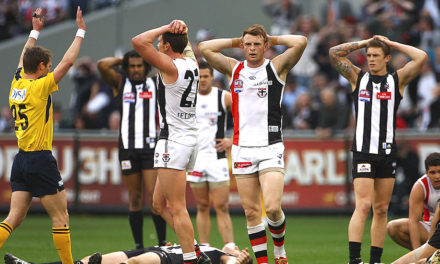
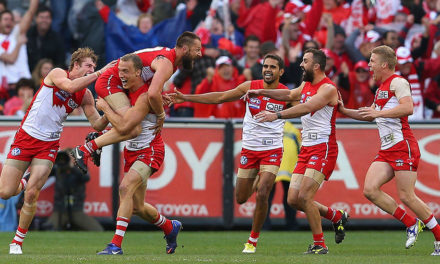
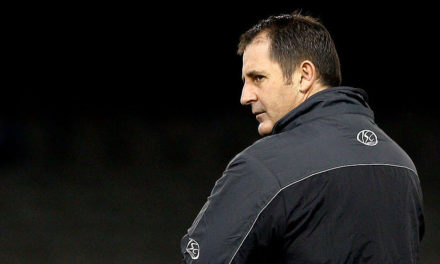
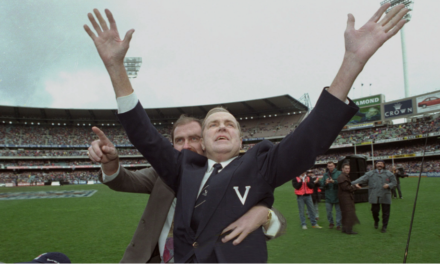






Best days of my life was going to Princes Park, eating donuts, drinking beer, laughing even when we down at half time because we knew come 3rd quarter the Blues would get on their roll. The atmosphere out front of the George Harris Stand (Social Club) was just incredible! I yearn for the Princes Park.
Its been a long dark decade but I must say i am genuinely excited about this current team under Brendan Bolton…I see a 17th Premiership not too far away!
Still, i miss Perovic, Wow Jones, Jimmy Buckley, Wayne Johnston, Bruce Doll, Peter Buzza, the list goes on!
Might Blues!
They may not be measured in the same breath because two of their three premierships came against Collingwood.